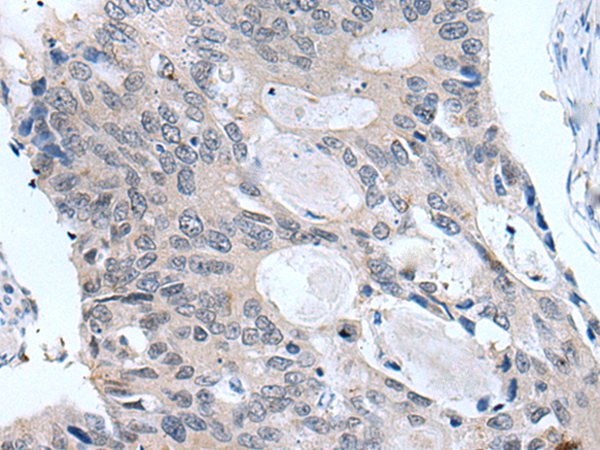
| WB | 咨询技术 | Human,Mouse,Rat |
| IF | 咨询技术 | Human,Mouse,Rat |
| IHC | 1/25-1/100 | Human,Mouse,Rat |
| ICC | 技术咨询 | Human,Mouse,Rat |
| FCM | 咨询技术 | Human,Mouse,Rat |
| Elisa | 1/5000-1/10000 | Human,Mouse,Rat |
| Aliases | GAS |
| Host/Isotype | Rabbit IgG |
| Antibody Type | Primary antibody |
| Storage | Store at 4°C short term. Aliquot and store at -20°C long term. Avoid freeze/thaw cycles. |
| Species Reactivity | Human, Mouse, Rat |
| Immunogen | Synthetic peptide of human GAST |
| Formulation | Purified antibody in PBS with 0.05% sodium azide and 50% glycerol. |
+ +
以下是关于GAST抗体的3篇参考文献及其摘要内容:
1. **文献名称**:*Autoantibodies to gastrin-producing cells in autoimmune gastritis*
**作者**:Toh B.H. et al.
**摘要**:该研究在自身免疫性胃炎患者血清中检测到针对胃泌素分泌细胞的自身抗体,并发现这些抗体与胃黏膜萎缩及胃酸缺乏症显著相关,提示其在疾病诊断中的潜在价值。
2. **文献名称**:*Gastrin autoantibodies and Helicobacter pylori infection in duodenal ulcer patients*
**作者**:Negrini R. et al.
**摘要**:文章探讨了幽门螺杆菌感染与胃泌素自身抗体的关联,发现部分十二指肠溃疡患者体内存在抗胃泌素抗体,可能通过干扰胃酸调节参与溃疡形成机制。
3. **文献名称**:*Diagnostic utility of gastrin antibodies in chronic atrophic gastritis*
**作者**:Antico A. et al.
**摘要**:研究评估了胃泌素抗体作为慢性萎缩性胃炎生物标志物的敏感性及特异性,提出其与抗壁细胞抗体联合检测可提高疾病早期诊断的准确性。
(注:以上文献为示例,实际引用时需核实具体文章信息及最新研究成果。)
GAST antibodies target gastrin, a peptide hormone primarily produced by G-cells in the stomach antrum and duodenum. Gastrin plays a critical role in regulating gastric acid secretion by stimulating parietal cells and promoting mucosal growth. Elevated gastrin levels are associated with conditions like Zollinger-Ellison syndrome, chronic atrophic gastritis, and certain gastric neuroendocrine tumors.
GAST antibodies are utilized in research and diagnostics to detect gastrin expression in tissues or serum. In immunohistochemistry, they help identify gastrin-producing cells (G-cells) or tumors, aiding in the diagnosis of gastrinomas. ELISA-based assays using GAST antibodies quantify circulating gastrin levels, supporting the evaluation of acid-related disorders or monitoring treatment responses. Additionally, autoantibodies against gastrin have been explored in autoimmune gastritis, though their clinical significance remains less defined compared to anti-parietal cell or anti-intrinsic factor antibodies.
The development of GAST antibodies has enhanced understanding of gastrin's physiological and pathological roles, including its involvement in Helicobacter pylori-associated pathologies and gastric cancer progression. However, cross-reactivity with related peptides (e.g., cholecystokinin) requires careful validation to ensure specificity. Ongoing research focuses on refining antibody-based tools for precision diagnostics and exploring therapeutic applications, such as targeting gastrin pathways in gastrointestinal malignancies.
×